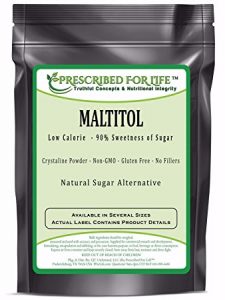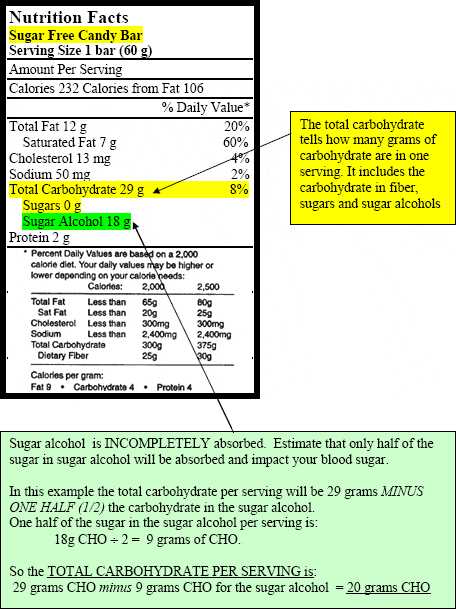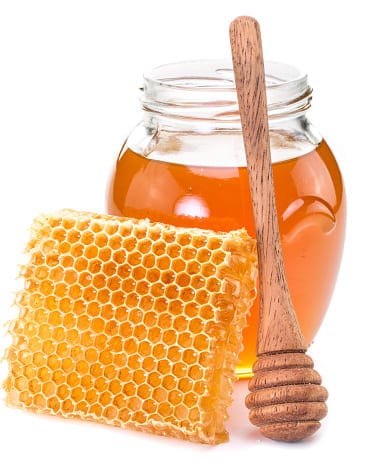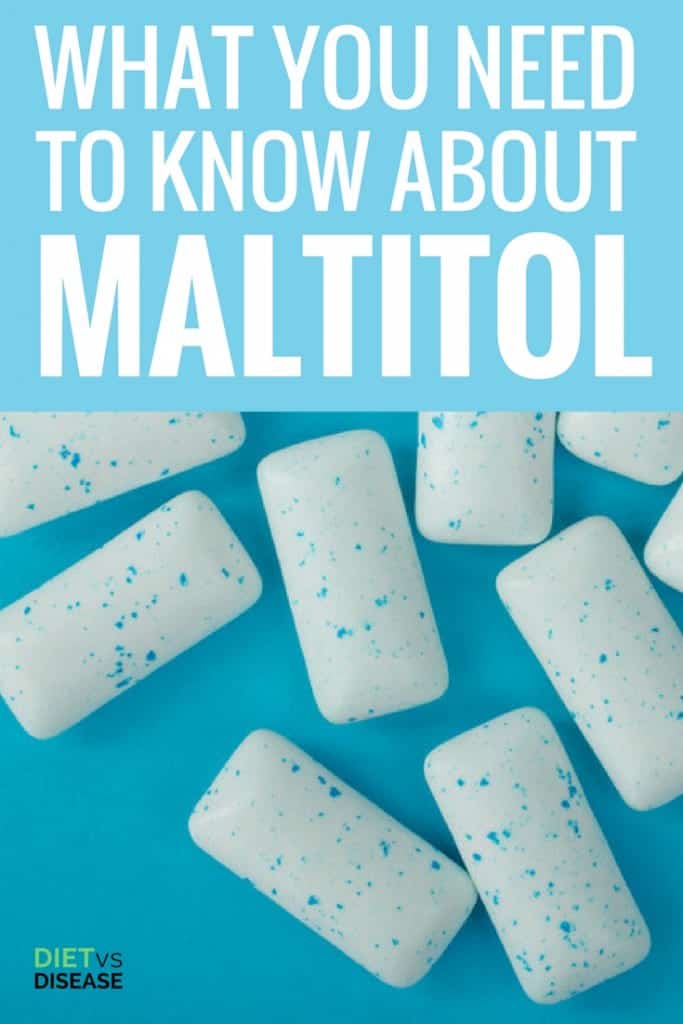Maltitol is an ingredient often found in low-calorie and sugar-free foods.
But is it a healthy sugar alternative?
This article will explain what maltitol is, why it’s used and whether you should avoid it.
What is Maltitol?

Maltitol is a type of sugar alcohol, also called a polyol, that is used as a sweetener.
It doesn’t contain alcohol in the sense that alcoholic beverages do. Rather, sugar alcohol refers to its chemical structure.
Maltitol is found naturally in small amounts in some fruits and vegetables, chicory leaves and roasted malt.
It can also be manufactured by adding hydrogen to maltose, a sugar found in starches like corn, potatoes and wheat. In food processing, it’s often made from corn starch.
Why Use Maltitol?
Maltitol is a low-calorie sweetener used in processed foods and drinks.
It’s a useful replacement for table sugar (sucrose) because it’s almost as sweet (about 90%), but lower in calories. It tastes similar to sucrose as well.
Maltitol can prevent browning and add moisture to processed baked goods. It’s sometimes added to chewing gums and candies to create a cooling sensation in the mouth.
Some medications and skin moisturizers also contain maltitol.
Nutritional Value of Maltitol
Maltitol is a carbohydrate that contains 2.1 calories per gram (2).
It has fewer calories than most carbohydrates, including regular sugar, which has 4 calories per gram.
Maltitol contains no vitamins, minerals or fiber.
Summary: Maltitol is a sugar alcohol used as a low-calorie sweetener in processed foods and drinks. It tastes similar to sucrose (regular sugar), but contains half the calories. It does not have any other nutrients.
What Foods Contain Maltitol?

Products labeled “sugar-free,” “no sugar added” or “reduced-calorie” often contain maltitol.
It may be found in:
- Sugar-free candies
- Sugar-free chocolate
- Energy bars
- Baked goods
- Cream and fruit fillings for baked goods
- Chewing gum
- Fondant and other frostings
- Ice cream
- Dairy desserts
Summary: Maltitol is often found in reduced-calorie and sugar-free foods, including candies, chocolate, chewing gum and ice cream.
Is Maltitol Safe?

The United States Food and Drug Administration (FDA) lists maltitol as a GRAS (Generally Recognized as Safe) substance (3).
So it is safe for the majority of people. But there are always exceptions of course…
Does Maltitol Cause Diarrhea and Other GI Problems?
Maltitol doesn’t cause any long-term illness or disease, but some people who eat large amounts of it can experience bloating, gas or diarrhea.
These gastrointestinal (GI) problems happen because maltitol is not completely absorbed during digestion. Instead, when it reaches the large intestine it becomes fermented by bacteria, which can potentially cause the gastro symptoms (4).
The FDA requires products containing over 50 grams of maltitol or other sugar alcohols to carry a warning about potential laxative effects (3).
Other countries, including Australia, Canada and New Zealand, also require similar warnings (5).
But even small amounts of maltitol cause GI problems for some people.
One clinical study found that as little as 40 grams of maltitol led to increased stomach gurgling and flatulence. The group given maltitol were more than twice as likely to experience these unpleasant side effects versus the group given sucrose (6).
Maltitol may also cause diarrhea in people who don’t usually eat foods or drinks containing sugar alcohols. For example, if you don’t typically consume sugar-free candies but end up eating some for a few days in a row, you may get an upset stomach or diarrhea (7).
The size of your meal and how long it has been since you last ate can also affect whether maltitol will cause diarrhea (4).
Is Maltitol Safe for People with Irritable Bowel Syndrome?
People with irritable bowel syndrome (IBS) may be more likely to experience stomach pain, diarrhea or flatulence when consuming maltitol.
While other food substances cause trouble for people with IBS, sugar alcohols such as maltitol may be part of the problem.
Following a low-FODMAP diet that limits sugar alcohols can help.
A recent analysis of randomized, controlled trials reported that people with IBS who followed a low-FODMAP diet were 66% less likely to experience severe abdominal pain, diarrhea, bloating or constipation (7).
Is Maltitol Safe for People With Diabetes?
Maltitol is safe for people with diabetes.
However, keep in mind that it’s a carbohydrate so it will affect blood sugar.
The glycemic index of maltitol is 35, which is much lower than that of sucrose (65). This means that blood sugar will rise less quickly after eating maltitol than it would after eating the same amount of sucrose.
For people taking insulin, dietitians suggest checking the sugar alcohol content of foods when counting carbohydrates. If there are more than 5 grams of sugar alcohols, subtract half of those grams from the total grams of carbohydrate and count that as the “available carbohydrate” for insulin adjustment purposes (8, 9).

Image Source
Even though maltitol doesn’t cause blood sugar to rise as quickly as sucrose does, that doesn’t mean you should eat as much of it as you want.
Increasing evidence suggests that using low-calorie sweeteners like maltitol on a daily basis is associated with weight gain and increased blood sugars over time (10).
Is Maltitol Safe For People Who Avoid Gluten?
Maltitol is gluten-free.
Even when it’s made from wheat, maltitol does not contain any wheat proteins. Therefore, it’s safe for those who need to avoid gluten.
Can You Be Allergic to Maltitol?
Maltitol rarely causes allergic reactions, even in people with corn or wheat allergies.
In fact, there only appears to be one noted case of a severe allergic reaction. In this case, researchers suspected maltitol may have caused anaphylaxis because no other food allergies were found (11).
Summary: Maltitol is safe, even for people with diabetes and food allergies. However, it may cause diarrhea, bloating or flatulence, especially in those with irritable bowel syndrome.
Are There Any Benefits to Using Maltitol?

Since it has fewer calories than sugar, maltitol could potentially help people lose weight.
However, people tend to overindulge in maltitol-containing foods that are labeled “low-calorie” or “no sugar added.” Remember, these products still have calories and eating too much of anything can cause weight gain.
Some people prefer maltitol because it doesn’t have an unpleasant aftertaste like some other sugar substitutes.
Another advantage maltitol has over sugar and many other sweeteners is that it doesn’t cause cavities or tooth decay. One randomized, controlled study found that among people not regularly brushing their teeth, chewing gum with maltitol significantly reduced gingivitis.
Scientists are still in the beginning stages of looking into some other possible benefits of maltitol.
For example, a study in rats found that maltitol protected against colon cancer. Rats who were given maltitol were only 53% as likely to develop colon cancer as those who were not given it (12).
Maltitol is also being studied as a potential treatment for liver disease. In a study using mice in the beginning stages of liver disease, those given maltitol for 8 weeks had less weight gain, lower blood sugar and lower cholesterol (13).
Summary: Since maltitol has fewer calories than sugar, it could be useful for people trying to lose weight. It doesn’t cause cavities or have an unpleasant aftertaste like some other sugar substitutes.
Alternatives to Maltitol

If you want to avoid maltitol, consider products containing either sucrose, sugar substitutes or natural sweeteners.
While sucrose has more calories than maltitol and can cause cavities, it doesn’t usually cause stomach upset.
Artificial sweeteners like aspartame and sucralose don’t have any calories and generally don’t raise blood sugar. However, new research shows that they might negatively affect gut bacteria and insulin sensitivity (14).
Stevia is also calorie-free and doesn’t affect blood sugar. However, it’s often blended with other carbohydrates like dextrose or maltodextrin, which do affect blood sugar.
If you want a less processed alternative, look for products sweetened with real fruit juice, honey or maple syrup.
If you are sensitive to maltitol, it’s probably wise to avoid xylitol and sorbitol as well. They are sugar alcohols that can cause similar GI problems.
Erythritol is another sugar alcohol, but it may cause fewer GI side effects than other types(15).
To completely avoid maltitol and other sugar alcohols, choose whole, unprocessed foods.
Summary: Alternatives to maltitol include sucrose, artificial sweeteners, stevia, erythritol, honey and maple syrup. If maltitol upsets your stomach, you may want to avoid sorbitol and xylitol as well, since they can have similar effects. The easiest way to avoid maltitol is to choose whole, unprocessed foods.
Maltitol Summed Up
Maltitol is a sugar substitute often found in low-calorie and sugar-free foods and drinks.
It has about half the calories of sucrose and a lower glycemic index.
Maltitol is certainly safe for the majority of people. However, it may cause diarrhea, bloating and flatulence, especially in people with irritable bowel syndrome.
While it can provide a lower-calorie option for people trying to lose weight, it’s generally found in heavily processed foods, which often contain little or no fiber and lots of unhealthy fat.
Overall, choosing real, whole foods without added sugars is the best way to manage your weight.
Would you like more information on how to start a low FODMAP diet?

Tap the blue button below to download our “Eat This, Not That” list as well as additional resources for IBS and digestive issues (it’s free!)

